L’Ombre Et La Nuit, the fourth LP of French band Varsovie, was one of our favorite albums of last year. It combined the passion and the poetry that we look for in music in a superb way. To know more about them, we have interviewed Arnault Destal, drummer, lyricist and composer of the post-punk band that we will see live in a few weeks. They will be playing at the Liège New Wave Festival next 17th of September with four more fantastic bands.
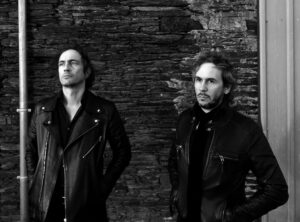 —Arnault, you created, according to you, an “avant-garde black metal” band called Forbidden Site. What can you please tell us about this? Was black metal your first music interest?
—Arnault, you created, according to you, an “avant-garde black metal” band called Forbidden Site. What can you please tell us about this? Was black metal your first music interest?
—Black metal was not my first musical interest because black metal, as it is defined today, did not really “exist” when I started to be interested in music. I was already listening to post-punk (Bauhaus, Joy Division, Christian Death, And Also the trees…) and other stuff, from Noir Désir and Sisters of Mercy to Slayer, before discovering this style around 1992. I’ve simply always been attracted to dark, odd, cold, alternative music… Anyway, Forbidden Site was a “teen project”. I met someone who was willing to join me in this delirium, when this style was quite fresh and did not have the magnitude it currently has. We appropriated it by adding a kind of “French touch”, with a dark decadent romantic concept based on the 19th century… Musically, we had integrated a lot of goth, punk and classical elements on a black metal matrix that made it sound a bit special – at the time at least. Anyway, it was just 5 short years of my life, quite intense, but which remain attached to my first steps in adult life, with all their clumsiness. It all seems a long way off to me now, although sometimes I feel nostalgic about this pre-Internet era when many things concerning the music business were different.
—Grégory joined Forbidden Site at the end of the band. Did you know each other from before or you just met in the band?
—Originally Greg came to our shows as a fan and I started hanging out with him through different groups of mutual friends. In the summer of 1998 we needed a second guitarist and we advertised in our city. He has responded immediately, was very motivated and knew how to play everything. We immediately took him on board. But a year later the band was dead (or dying), since the other co-founder decided to embark alone on a mainstream project. I really wanted to stop making music, but Greg wanted to continue with me. Finally, he was right to insist.
—When did the two of you created Varsovie? How were the first years? Arnault, you said that you were not really believing in the band at the very beginning.
—Officially, Varsovie was born in 2005, when we decided on this name. It’s not that I didn’t believe in the band at first. At first, the band didn’t really exist, because I refused to get fully involved and to get again into all those things that make a band exist: management, art direction, tours, promotion, etc. I just let things go… That’s why nothing really happened between 2000 and 2005… I continued to play with Greg sometimes, recording few DIY things, but a little out of spite. I did not see myself starting a new band all over again from zero… In addition, at that time, I was a bit in a “no future” dynamic… In short, I needed time to “mourn” and believe in the possibility of a new interesting project. One day, so to speak, everything changed, the motivation returned and Varsovie was born. The condition was to stay into something “dark”, but colder, in the post-punk spirit, different from my past project. That’s how we started playing in our city and recording our first demo. I started a little promo, made a website, developed a particular imagery… In 2006, we recorded our first EP and in 2007 we began to play all over Europe. Finally, we wanted to make the music that we ourselves would like to listen to, with the idea that it can reach other people who could in turn take hold of it, make their own films.
—Arnault, as a person whose music tastes don’t include metal, I would like to ask you if post-punk was a genre where you could use your literary influences better than in black metal? Were you writing different lyrics when you were in Forbidden Site?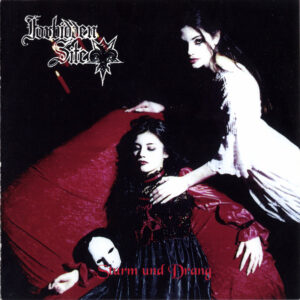
—It’s different because Forbidden Site was a kind of concept band, with themes related to the 19th century. So the lyrics style had to be connected to this universe. Varsovie is not a concept band, all subjects, all periods can be covered and my writing adapts according to the atmosphere, to the frame. Some are very modern, others more classic, even if the whole remains stylistically coherent. In this, we are more connected to our time. Fortunately, the lyrics evolved, since most of the texts of my past band were written when I was teen.
—Warsaw was the name of the first incarnation of Joy Division. When you choose your name, were you trying to pay homage to the band from Manchester? The first name you used was Ex Cathedra, right?
—The name of the band comes from one of our first songs created around 2004-2005, called “Varsovie”, which symbolically evoked the Warsaw uprising in 1944 – it was of course also a hint to Joy Division‘s Warsaw which was one of our influences. The night we decided on this name, I felt that it was getting serious and that we had to start giving ourselves the means to move forward. Ex Cathedra was just the name of the band when the band was not really a band.
—We would like to talk about one of your influences, Alain Bashung. Not being French, I don’t really know a lot about him. How do you think he has influenced Varsovie and what should I listen to get familiar with his work?
—He was one of the most important French artists in our opinion. With a great work on the atmosphere, the texts, full of dark humor, striking images and melancholy, a unique voice, a touching character, very challenging, above all… That said, his career is so long that it is not easy to discover him at random. There are at least three, even four major periods, charged with various musical influences and with emblematic lyricists like Boris Bergman, Serge Gainsbourg, Jean Fauque or Gérard Manset… I think that the best album to approach Bashung is perhaps Fantaisie Militaire – or L’Imprudence for the darkest minds.
—Also, so far we never got the chance of speaking about Polish new wave and you have mentioned Siekiera and other bands from 1984 as influences. What did you find interesting about their music? Their atmospheres? You have also covered a Siekiera’s song, right?
—The Polish post-punk scene was great – and it still is. There is an urgency and an energy that cannot be found elsewhere – a sincerity too. It’s important to us to feel all of that. We like bands like 1984, Armia, Madame, Variété, Wieże Fabryk, Made in Poland and of course Siekiera… We covered their title track “Nowa Aleksandria” in 2010, but we had no interest in trying to do the exact same thing. That’s why we changed the rhythm, the arrangements and invented the long instrumental finale. This is also why I adapted the Polish lyrics in French for the second verse. The idea was to make something a bit personal out of this cult song.
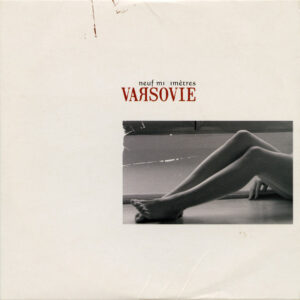 —Since the first EP Neuf Millimètres, the band has written about historical moments, like in the song Varsovie or Leningrad. In an interview, you said that you like to tackle personal issues through historical moments. Can you tell us more about this?
—Since the first EP Neuf Millimètres, the band has written about historical moments, like in the song Varsovie or Leningrad. In an interview, you said that you like to tackle personal issues through historical moments. Can you tell us more about this?
—It’s just that some historical events can refer to more singular, more intimate dynamics… I like to play on these correspondences in the lyrics – put everyday life in the face of larger, more universal events…
—You have talked about the importance of French culture for the band. In which way do you think that being French has marked Varsovie?
—The fact that we sing in French, mainly. What we are sometimes reproached for, as if it were the height of pretentiousness to sing in our mother tongue… The reality is that French is not easy to manage, but it’s a bit of work on the sentences and the vocal rhythm, because this language is much more rigid and restrictive than English when it comes to singing in “rock music”. It’s just the language that we handle best, with which we express emotions with the most accuracy. We have nothing against English singing, but for now French suits us better. In general, we appreciate when bands dare to sing in their own languages – and it stands out of total standardization.
—There are references to Nerval, Pavese, Mishima or Scott Fitzgerald in your songs. Is Literature your main influence for the lyrics? Do you get inspired when you are reading a book or just link a topic to a writer?
—I think it’s the most visible influence, but it’s not the main influence. A book can inspire me or the unique journey of an author, but it’s above all a kind of starting point. It is rare that I speak directly about a writer, except in “Hôtel Roma2 (Pavese), “La Fêlure” (FS Fitzgerald), “Sunsiaré” (Sunsiaré de Larcône), “Leningrad” (Essenine) and “Etat Civil” (Jacques Rigaut), which is not so much on about 50 songs now. A song like “L’Ombre et la Nuit” linked to Francis Giauque does not speak directly of him. It’s a ghost that just passes in the background. These authors are sometimes simple elements of the background. They are characters that I use to fix a state of mind, a mental season. The lyrics are a way of evacuating a discomfort, sometimes frustrations, to exorcise a lot of things, but also to draw up landscapes in darkness, to open up other perspectives. It is also a way to evoke fascinating characters, with singular paths, and a way to stage moments of tension or brutal change. Cinema is also an influence, as well as many others out of the artistic sphere. One of the objectives remains to exorcise certain points for oneself and to put the forms for possible receivers. We like that the listener can tackle his own visions, his course, his projections, his fantasies, even if we move away from the initial idea. We will never be able to control the final impact of a text, since its interpretation can vary from one listener to another.
—Etat Civil was your first long play. First, it was released self-released but four years later it was published by a record company, Those Opposed Records. Was it difficult to find a company who wanted to release it? How was the French post-punk scene at the time?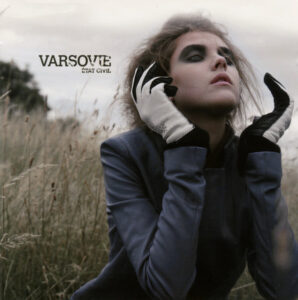
—Actually, Etat Civil was originally released on the French cold-wave label Infrastition, but only on CD. Later, Those Opposed Records offered to press it on vinyl, at the same time as the second album L’Heure et la Trajectoire. At the time (2005-2010), the post-punk scene, at large, was much more restricted here – at least that’s the impression we had! It was even difficult to find other post-punk bands to share the stage with and we often had to play with bands of very different musical genres, just because there were absolutely no post-punk bands around. We knew almost everyone in the scene and had friends in bands like Violet Stigmata or Eat Your Make Up… I remember many gigs with Joy Disaster, Guerre Froide, Object, Soror Dolorosa and the events in Le Klub (Paris) with Lionel of Manic Depression, a festival at Le Bataclan with, among others, our friends of Scarlet’s Remains (USA). Mutual support was important. Of course, there are now many more bands labelled post-punk than 10 years ago, but paradoxically we know fewer people. Maybe we got wilder.
—Your releases have been spread in time with three or four years gaps between albums. Is real life taking too much of your time? Or you just wait to be inspired?
—Yes, it’s too long and I hate that. Sometimes, the difficulties were financial. Sometimes, our studio in Bretagne is not available. Sometimes, the pressing of records takes time, the design takes time. Sometimes, the labels prefer to wait for a certain date for the release. Sometimes we have “mixing problems”. Sometimes, Covid-19’s party begins and shatters all the plans… In the end, it’s not so much the composition that takes us so much time – even if we like to step back on our songs so as not to offer sloppy songs to people –, but a lot of combined exterior parameters. We are in Summer 2022 and the composition of the 5th album is finished since weeks. The studio is not available for now. Once available, it will be necessary to hope that the mix and the mastering do not drag out, then that the pressing of the discs is fast enough so that we can have a release date not too far away. So, normally: 2023… but I can’t tell you which month.
—In your second album, L’Heure et la Trajectoire, we can find a song about Lydia Litvak, a fighter pilot in the Soviet Air Force during World War II. In the same album, there are more songs with bellicose subjects as “Austerlitz”. Do you think we should have present all these moments of past history to try to avoid repeating them?
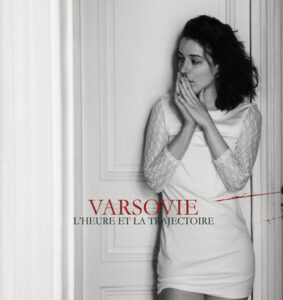 —In fact, “Austerlitz” evokes the train station in Paris, its people, and its scenery, not the battle. It’s a kind of pictorial digression on contemporary urban life – but I like to play with these ambiguities. Accordingly, “Lydia Litvak” doesn’t really evoke the pilot directly, but someone who projects herself through her image of independence, self-confidence and heroism, while her own life seems blocked, in a phase of apathy and disgust. That said, you’re right, history tends to repeat itself, so it’s never the best thing to forget what happened not so long ago. The immediate news proves it to us day after day. By the way, “L’Offensive”, in our last album, resonates on the main lines with the situation in Ukraine.
—In fact, “Austerlitz” evokes the train station in Paris, its people, and its scenery, not the battle. It’s a kind of pictorial digression on contemporary urban life – but I like to play with these ambiguities. Accordingly, “Lydia Litvak” doesn’t really evoke the pilot directly, but someone who projects herself through her image of independence, self-confidence and heroism, while her own life seems blocked, in a phase of apathy and disgust. That said, you’re right, history tends to repeat itself, so it’s never the best thing to forget what happened not so long ago. The immediate news proves it to us day after day. By the way, “L’Offensive”, in our last album, resonates on the main lines with the situation in Ukraine.
—Instead, the name of your third album, Coups et Blessures, it is a reference to the blows and wounds that we suffer from or inflict on ourselves. How many blows has Varsovie received?
—A good amount I guess, but not enough to put us down.
—We really loved your last album L’Ombre et la Nuit, according to me, a true masterpiece. How has Varsovie arrived here? How have the two of you changed during these years?
—Thank you! I think we go more straight to the point without asking ourselves too many questions. The last album is certainly the blackest of all, but that’s just the album that we wanted to do at this time. The next one might be slightly different. Our goal is still to write good songs the moment we write them and try not to offer “fast food music” just to please the trend. And for the first time, we are happy with the sound which is almost the sound we dreamed of – which is not always easy to achieve… During these years… We evolved, but we didn’t change that much I guess…
—The song “Kissa Kouprine” is about a model from the 1920s. There is a certain melancholy of the past in your music. Do you tend to idealize a time that you have not lived?
—This song evokes precisely that. Someone who only lives through the idea of a bygone golden age and suddenly no longer knows how to live, unfit for happiness, incapable of grasping the present. It’s the incompetence to seize the day, when life seems to hang only by a thread that can break at any moment. The character just lives like a ghost in the interstices of our time. We’ve been able to cross this deleterious illusion sometimes, but I believe we are vaccinated now.
—The covers of your albums and also the videos of your songs try to keep a general vibe. How involved are you in the creation?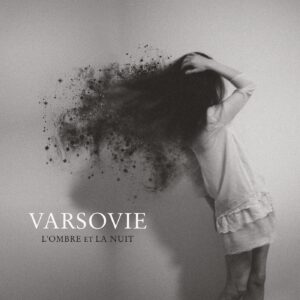
To talk about the last album, the visuals were supposed to be quite different. In the meantime, I came across the pictures of the Irish artist Deborah Sheedy and I was fascinated by her work which fitted perfectly with the atmosphere of this album. It’s important that the image matches the atmosphere, of course, and I’ve always tried to pay attention to that, with the means at hand, sometimes, with more or less success, but we’re very happy with what was done on the last one, in particular on the video clips of “Kissa Kouprine” (Deborah Sheedy) and “L’Offensive” (The Windy Burrow). For the rest, I managed on my own, in DIY mode – photos, videos, etc. I don’t have any particular talent and skills in these things, but I try to do my best not to ruin the initial intention.
—Would you like to add more musicians to the band, or you think that the two of you are just the perfect number? Is it easy to compose songs together?
—It’s the perfect number for us, for the way we work. We tried to work with several musicians at the beginning… If ideas of arrangements can come more easily, it is very quickly unmanageable. We have a very precise idea of our music and other composers would only add chaos. Also we don’t need any extra riffs, extra rhythms or extra lyrics, since all our work is (mainly) cutting, cutting and more cutting. It’s easy to work, in the sense that we’ve been doing this for more than fifteen years and that everything is very compartmentalized, everyone knows their talents, their skills, and therefore their place, so we avoid wasting time to spare everyone’s susceptibility. In addition, we also prefer to be only two in the studio to record our albums now. It’s demanding work which can be stressful and we’ve had inconclusive experiences with other musicians. Anyway, Varsovie is also a live band that takes the form of a trio. Since the summer of 2021, Gilles, from Lux Incerta, who comes to us from Nantes, is playing the bass with strength and class on stage.
—Arnault, you are a literature critic, do you think that doing this work has changed your way of writing? Do you look at your text as a critic?
—I’ve been doing literary reviews for years, in different magazines, but I’m not a literary critic. It’s not my main job, although my main activities are related to writing. I spent more time encouraging authors or books that deserved it than slandering works that don’t interest me. In this, I am not a real literary critic, but a tourist of literary criticism… I do this work on occasion, when I am asked and when I feel like it. In any case, that has absolutely no influence on my way of writing in Varsovie, it’s another job. That said, I am extremely critical of what we do in Varsovie, but I don’t think that’s a bad thing at the end.
—You are also writing a novel, right? Can you please tell us more about this?
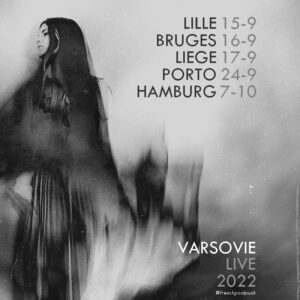 —Not a novel, but short stories… I’ve been writing short stories/novellas for years. I have recently been publishing in magazines and I intend to publish a collection as soon as I have the time, the desire and the opportunity. It’s still a different work from what I do in Varsovie as there is also a larger part of humor and absurdist fiction.
—Not a novel, but short stories… I’ve been writing short stories/novellas for years. I have recently been publishing in magazines and I intend to publish a collection as soon as I have the time, the desire and the opportunity. It’s still a different work from what I do in Varsovie as there is also a larger part of humor and absurdist fiction.
—What are your plans for the future of the band?
—To record our 5th album this winter, hoping it won’t take too long to be released, and play concerts at a “normal pace”, since recent events (pandemic, war…) have cancelled (or postponed forever) most of our dates these last months. A few concerts this autumn however: Lille, Bruges, Hamburg, Porto and of course Liège. Details are on our FB page.
—What can we expect of your concert at Liège New Wave Festival?
—A mix of old albums and new albums with a certain touch of violence.




